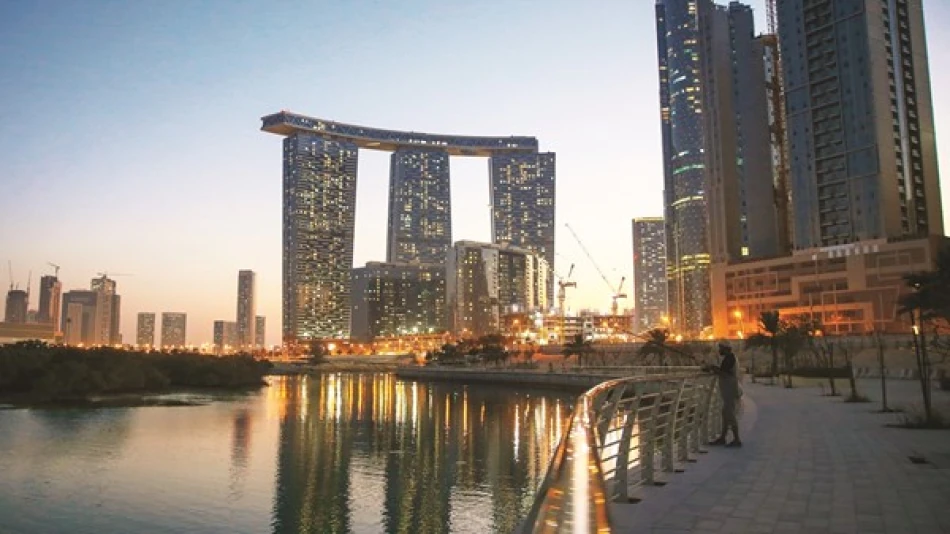
Abu Dhabi's Rental Yields Soar to 8.5% by 2025, Promising Lucrative Property Investments
Abu Dhabi's Real Estate Delivers 8.5% Returns, Outpacing Global Financial Capitals
Abu Dhabi's property market has emerged as a standout performer in 2025, with rental yields averaging 8.5% - more than double the returns offered by established global cities like London, New York, and Singapore. This surge positions the UAE capital as one of the world's most attractive real estate investment destinations, driven by tax advantages, regulatory clarity, and surging demand that far exceeds supply.
The Numbers Tell a Compelling Story
The performance gap between Abu Dhabi and traditional investment hubs is striking. While investors in London struggle with yields of 2.5-4%, Paris delivers 3.5-4%, New York offers 2.9-3.5%, and Singapore provides 2-3.8%, Abu Dhabi's residential properties are generating returns between 8-9.31% according to specialized real estate platform Bayut's quarterly report.
The most impressive returns are concentrated in specific property types and locations. Studio apartments in Al Reef district are delivering 9.31% yields, with annual rents averaging AED 45,000 against purchase prices of AED 487,000. One-bedroom units in the same area generate 8.43% returns, while three-bedroom properties on Al Maryah Island achieve 8.38% yields.
Premium Locations Drive Performance
Reem Island, Raha Beach, and Yas Island continue to attract luxury apartment buyers, reflecting a market that's increasingly sophisticated in its geographic preferences. These areas combine lifestyle amenities with strong rental demand, creating the conditions for sustained high yields.
Why Abu Dhabi is Outperforming Global Markets
The exceptional returns stem from structural advantages that most competing cities cannot match. Zero personal income tax means investors keep their full rental income, while no capital gains tax on property sales further enhances total returns. This tax environment alone can add 2-4 percentage points to effective yields compared to high-tax jurisdictions.
Masoud Al Awar, CEO of Medallion Associates, points to additional factors including market stability, clear investor protection laws, and supportive government initiatives for foreign investment. The regulatory framework provides certainty that's often lacking in emerging markets, while offering returns that developed markets cannot match.
Supply-Demand Imbalance Fuels Growth
Rising demand against constrained supply in strategic locations is creating pricing power for property owners. Population growth, business expansion, and Abu Dhabi's positioning as a regional hub are driving rental demand across residential and commercial segments.
Commercial Real Estate Offers Even Higher Returns
While residential properties deliver impressive yields, commercial real estate is generating 7-10% returns according to industry executives. This reflects Abu Dhabi's growing status as a business center, with companies seeking modern office space in prime locations.
Ali Al Jubaili, Chairman of One Real Estate Development, notes that investor appetite is strongest for properties ranging from studios to three-bedroom units, suggesting a market driven by both end-users and yield-focused investors.
Sustainable Growth or Speculative Bubble?
The sustainability of these high yields depends on continued economic growth and population expansion. Maher Rahbi, Executive Director of Nord Real Estate Development, argues the growth is sustainable, pointing to ongoing infrastructure development and the August 2024 launch of Abu Dhabi's first official rental index as evidence of market maturation.
The rental index initiative demonstrates regulatory sophistication, providing transparency that supports both landlords and tenants while stabilizing the market's growth trajectory.
Tourism Adds Another Yield Layer
The revival of Abu Dhabi's tourism sector is creating additional opportunities through short-term rental demand. This adds a premium to properties in tourist-friendly locations, potentially pushing yields even higher for strategically located investments.
Global Investment Implications
For international investors, Abu Dhabi's performance represents a rare combination of high yields and political stability. While emerging markets sometimes offer comparable returns, they typically come with currency, regulatory, or political risks that Abu Dhabi largely avoids.
The market's performance also reflects broader trends in Gulf real estate, where oil wealth, economic diversification, and favorable demographics are creating investment opportunities that traditional Western markets cannot match. As global interest rates remain elevated, yield-starved investors are likely to continue seeking alternatives like Abu Dhabi's property market.
However, investors should consider that high yields often reflect rapid price appreciation that may not be sustainable indefinitely. The key question is whether Abu Dhabi can maintain its competitive advantage as other markets adjust their policies or as local supply eventually catches up with demand.
Most Viewed News

 Layla Al Mansoori
Layla Al Mansoori






